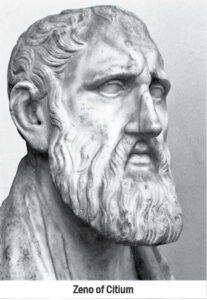 What is Stoicism? Many may be familiar with its philosophy, imbibing a lot of its tenets into everyday practice. For the uninitiated, “Stoicism teaches the development of self-control and fortitude as a means of overcoming destructive emotions; the philosophy holds that becoming a clear and unbiased thinker allows one to understand the universal reason (logos).” Stoicism promotes an attitude of calm indifference towards external events. The stoic view of life is that Virtue and Being Rational together, create an excellent mental space which is the key to a good, happy life. Stoics also believe that an ideal life is one that is in harmony with Nature, of which we are all part.
What is Stoicism? Many may be familiar with its philosophy, imbibing a lot of its tenets into everyday practice. For the uninitiated, “Stoicism teaches the development of self-control and fortitude as a means of overcoming destructive emotions; the philosophy holds that becoming a clear and unbiased thinker allows one to understand the universal reason (logos).” Stoicism promotes an attitude of calm indifference towards external events. The stoic view of life is that Virtue and Being Rational together, create an excellent mental space which is the key to a good, happy life. Stoics also believe that an ideal life is one that is in harmony with Nature, of which we are all part.
Stoicism is founded on three main beliefs: that ‘Virtue is sufficient for happiness’, with the four cardinal virtues being wisdom, courage, temperance, and justice; that ‘External goods and material things should be regarded with indifference’; and that ‘the world is providentially ordered by God’.
The founding principle of Stoicism is our ability to view ourselves, the world, and its people objectively and to accept their nature as is. When Zeno of Cyprus was shipwrecked and stranded on the island of Athens, he wandered into a bookshop and was quickly enamored by the teachings of Socrates. After studying with the great philosophers of his time, he decided to impart his wisdom to anyone who would care to listen. Thus, the philosophy of Stoicism was born. Zeno’s teachings spread quickly and was adopted by both – kings and slaves alike. Zeno would joke later, “I made a prosperous voyage when I suffered a shipwreck.”
 Centuries later, this very philosophy remains as relevant today in our modern, chaotic world. Stoic practices help bring calm, and fortitude in a stress infused world. Some of its main practices include:
Centuries later, this very philosophy remains as relevant today in our modern, chaotic world. Stoic practices help bring calm, and fortitude in a stress infused world. Some of its main practices include:
Develop An Internal Locus Of Control: Much of what happens in life is not really in our control. Stoics recognized this undeniable truth and focused instead on what they could do. In today’s world, frustrations and chaos prevail. The slightest inconvenience provokes annoyance, even rage! Our unhappiness stems from our emotional response. Once we learn to internalize that, we realize we have the power to be happy, regardless of our circumstances.
Time Is Your Most Valuable Resource: Time is the most valuable asset, once lost, it can never be regained. They strove to waste as little of it as possible. They affirmed that those who squander time on minutia or entertainment will find they have nothing to show for it in the end. They disapproved of procrastination or putting things off till the last minute. They also strongly opposed those who gave away their precious time to others freely, asserting that they were no better than those who completely waste it.
Accepting That Nothing Endures: In the grand scheme of things, we are just who we are in our own perception and exists only in our minds. None of what we’ve achieved will really matter in the end. It’s a sobering thought. We all experience the world like we are the center of its reality. In truth, it is only an illusion that inflates our own importance. Therefore, we need to understand that there really is no need to conform to irrational expectations and external pressures. We do not need to chase accomplishments in the hope of building a legacy or gaining recognition. What matters in the end is to live life on our own terms. It is the only way to truly say we have lived well.
Be Present: The ability to be quietly with yourself, peacefully present and aware of what is happening around you, is a sign you have worked hard to quiet your mind. As Seneca said, “Nothing, to my way of thinking, is a better proof of a well-ordered mind than a man’s ability to stop just where he is and pass some time in his own company.” To simply be in the moment is a powerful experience full of benefits.
Change Your Perspective On Failure: It is natural to see failure as a negative. After all, something you desired, expected or wanted wasn’t successful. But remember, that becoming the best version of yourself despite failure, struggles and challenges is the key to self-building and character. Let each failure become a valuable opportunity for personal growth. Don’t let adversity keep you from being compassionate, prudent, honest and humble. Let these things be the stepping stones to success
Toss Aside Ego And Vanity: Marcus Aurelius had remarked, “The universe is change, life is an opinion.” Things are never constant. The stoics believed that there is always wisdom to be gleaned, whether from the past, present or future. One of Epictetus’ biggest frustrations as a teacher was how his students claimed they wanted to learn, but secretly believed that they knew everything. When we decide that we’ve learnt enough or are somehow better off than our contemporaries, it is the ego and the arrogance of that very thought prevents us from true understanding. Life is but a process of learning and assimilation. The most brilliant minds read, they spend a great deal of time gaining knowledge. But knowledge and wisdom are different. The stoics understood it.
Teach Yourself How To Think, Not What To Think: This is perhaps the most important practice. The stoics believed that thought is the seed to every action. When you make a decision, ask yourself how it will affect your future self. Will it still be important, then? We only have the power to change ourselves. Practice self-discipline in all areas of life. Be mindful of your emotions. Acknowledge them, but don’t let them control you.
Don’t Expect Life To Be Fair: Your definition of fair is limited. You are neither your success nor failure. It’s external to you. Stoics believed in staying poised, in both – victory and defeat. Never compare yourself to others. You are on your path so stay focused on your journey, not theirs. Kindness, humility, gratefulness was all extolled by the stoics. To lead a fulfilled life, accept all change and don’t strive for perfection in all things. It is impossible to achieve and only leads to frustrations. Life is to be lived and loved in the moment.
Simply put stoicism was designed to help people live their best lives possible. Stoicism provides a framework for living well. It reminds us of what is truly important, providing practical strategies to get more of what is really valuable out of life.
- Navroz – A New Year, A New Beginning! - 15 March2025
- Women Are Simply Awesome! - 8 March2025
- Romantic Love – Win Some, Lose Some! - 8 February2025
